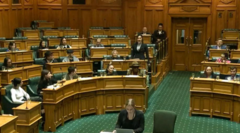French legislators have approved a bill allowing assisted dying for patients suffering from terminal illnesses. President Macron supports the legislation, which now moves to the Senate and aims for implementation by 2027. The bill's provisions focus on strict eligibility criteria, while public sentiment remains polarized on the ethical implications.
French Parliament Advances Bill for Assisted Dying Amidst National Debate

French Parliament Advances Bill for Assisted Dying Amidst National Debate
The National Assembly in France has taken a significant step towards legalizing assisted dying for terminally ill patients, with a majority vote that reflects a deeply divided society.
French legislators have voted in favor of a transformative bill that would grant individuals in the final stages of terminal illness the right to assisted dying. The National Assembly's decision, which saw 305 votes for and 199 against, is a pivotal moment for France, as it aligns with the vision of President Emmanuel Macron. The bill, now awaiting examination in the Senate, could potentially become law by 2027, placing France among a select group of European Union nations that permit some version of assisted dying.
However, the proposed French framework is more restrictive than that seen in leading countries like the Netherlands and Belgium, which pioneered assisted dying legislation. Additional legislation to establish a universal right to palliative care also received unanimous support, highlighting existing gaps in care—the current estimate indicates that nearly half of patients in need are not receiving adequate palliative services.
Macron highlighted the gravity of the bills' approval in a social media post, acknowledging the complexity surrounding these sensitive issues. The approved bill encompasses a stringent qualification process, primarily aimed at individuals suffering from severe and incurable illnesses and who are experiencing ongoing physical or psychological pain. To proceed with assisted dying, patients must clearly express their intention, endure a 48-hour contemplation period, and confirm their decision. Once authorized, the patient, or a medical assistant in cases of incapacity, would administer the lethal substance.
The passing of this bill was marked by a free vote among MPs, revealing diverse opinions that span across party lines. While centrist and left-leaning factions offered their support, conservative groups voiced significant concerns, fearing the bill's broad terminology could encompass patients with non-terminal conditions, thus increasing the risk for vulnerable individuals.
As opposition reveals deeper societal divides, one protestor, a 44-year-old with Parkinson's disease, expressed fears of coercion surrounding the decision to pursue assisted dying. Calls for broadening access to include minors and non-French nationals were voiced by some left-wing MPs, proving that further debate is likely to accompany future readings. Those in the medical community who oppose assisted dying would maintain their right to abstain from participation, albeit with significant penalties for any attempts to obstruct the process.
Prime Minister François Bayrou has indicated a personal dilemma regarding the bill, stating that he would have chosen to abstain if he had the opportunity to vote. The discourse surrounding assisted dying remains complex and contentious in France, with conversations on ethics and rights continuing as the nation navigates this significant legislative development.






















